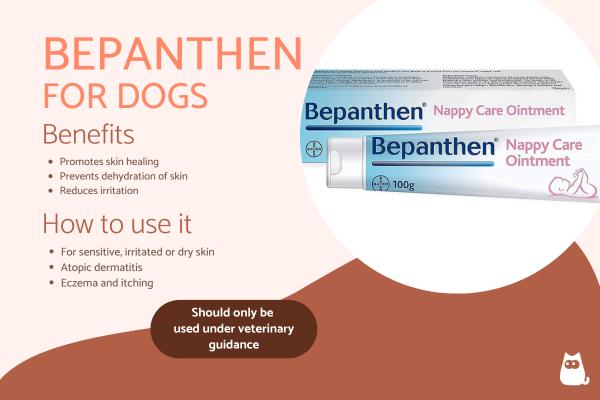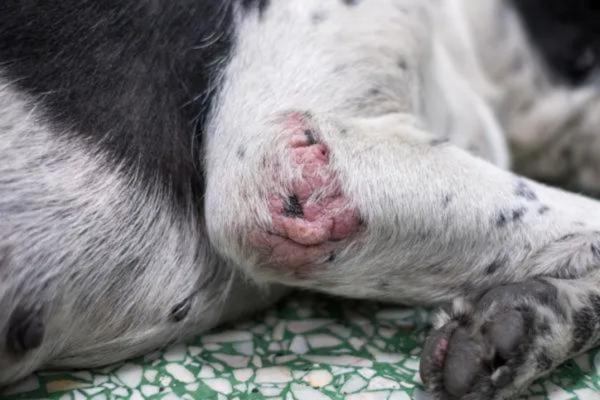Can Bepanthen Be Used on Dogs?



See files for Dogs
Although not formulated specifically for veterinary use, Bepanthen cream can be used on dogs in certain circumstances. This product is an ointment which is mainly used to treat minor skin injuries such as sunburn. For humans, it is also used to help skin repair after various types of damage. It binds to hair shafts, so it can also be used in haircare products such as shampoos and conditioners. Bepanthen also comes in various preparations such as an eye ointment, although its name may vary.
At AnimalWised, we ask can Bepanthen be used on dogs? In addition to the safety of Bepanthen for dogs, we look at its uses, side effects and contraindications.
Can Bepanthol cream be used on dogs?
Bepanthen is an ointment which has the active ingredient panthenol, the alcohol analog of vitamin B5. While this compound can be used in cosmetic products for humans, its used in veterinary medicine is limited to the promotion of wound. This means Bepanthen is safe for use on dogs, but only when used correctly.
Sold by the Bayer pharmaceutical company, Bepanthen is also marketed as Bepanthol in various markets. It is often marketed towards its use for babies, although it is also used regularly by adults. Panthenol is relatively mild on the skin and can help repair tissue damage without the need for steroid hormonjes such as cortisone. This means its use is safer and there are few side effects.
Purchsed over the counter, Bepanthen can be bought and used without prescription. Since they have been specifically dermatologically tested for use on humans, Bepanthen products should only be used on dogs when specifically indicated by a veterinarian.
Uses of Bepanthen cream on dogs
As previously stated, Bepanthen cream and similar products are topical medications which are used for the protection, care and repair of the skin. They can help reduce to reduce inflammation and calm the irritating sensation of burns and other minor injuries. This is thanks to the formation of a protective film of panthenol which protects the skin and limits dehydration. However, Bepanthen should not be used for open wounds.
The uses of Bepanthen on dogs may include:
- Sensitive and delicate skin
- Irritations
- Dry and/or cracked skin
- Chafing and peeling
- Atopic dermatitis
- Eczema
- Itching
- Allergic reactions
These types of dermatological conditions can be experienced by both humans and dogs. We might see the dog has one of the above skin conditions which has not been diagnosed by a veterinarian. A common issue is atopic dermatitis in dogs. Although it is considered safe for veterinary use[1], the veterinarian will need to diagnose the problem for effective treatment. For example, skin damage can be caused by parasites which Bepanthen cannot eradicate.
We also need to bear in mind that the skin of a dog is not the same as that of a human. The pH balance of the skin is different and the dog has certain natural oils which we do not produce. For this reason, Bepanthen is not necessarily the ideal topical product for our dog. When used improperly, it can harm recovery or delay the start of a more appropriate treatment.
Learn about healing wounds on a dog with our article on Betadine for dogs.

How to apply Bepanthen on dogs
If the veterinarian decides that a Bepanthen cream is appropriate to treat our dog's skin issue, they will explain the method of application. This includes how much to use, how often it needs to be applied and the overall length of administration.
Since dogs have coats of varying length, the hair in the area may need to be trimmed to achieve a uniform and more hygienic application. This will help to promote absorption so that it is more effective. It should be remembered that you should not put the cream directly on any open wound.
Bepanthen for dogs side effects
Bepanthen cream and similar products are generally considered safe for human use. In this way, they do not usually produce any significant side effects. If you notice any adverse reaction after use, the manufacturer recommends stopping the administrations and informing your doctor.
These topical products do not contain any addictive or harmful compounds, meaning they can be purchased over the counter and without prescription. This also means they are not suitable for all dermatological problems and may even harm recovery when used improperly. In these cases, we may see the clinical picture worsen and we will have to speak to a veterinarian.
As with humans, any product may cause an adverse reaction in the dog if they are sensitive or allergic to its composition. In these cases, we may see varying levels of reaction. It may simply stop the skin condition from healing, but it could also result in a worsening of the problem. In addition to the initial issue being treated, an allergic reaction causing inflammation, pain and even secondary infection may occur.
Learn more about hypersensitivity reactions in dogs with our article on what allergy medication is safe for dogs?
Contraindications of Bepanthen on dogs
Even if the veterinarian authorizes the use of Bepanthen for dogs, it is possible that some dogs may show hypersensitivity reactions to some of its components. In these cases, the administration must be ceased and the professional informed. Dogs with a suspected allergy to these creams cannot use them again.
Finally, we once again reiterate that applying Bepanten products to open wounds is contraindicated. We must also remember that we should not put any ointment on our dog without the veterinarian's prescription.
Learn more about problems which may be treated with Bepanthen for dogs in our article on causes of a dog's skin irritation.
This article is purely informative. AnimalWised does not have the authority to prescribe any veterinary treatment or create a diagnosis. We invite you to take your pet to the veterinarian if they are suffering from any condition or pain.
If you want to read similar articles to Can Bepanthen Be Used on Dogs?, we recommend you visit our Medicine category.
1. Vet One. (2023). d-Panthenol. Retrieved from:
https://www.drugs.com/vet/d-panthenol.html






